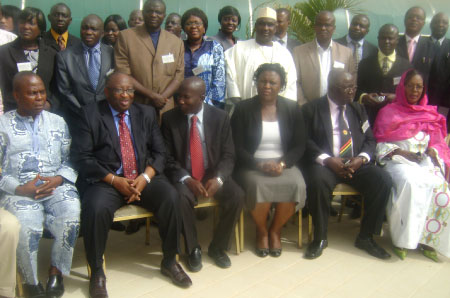
The West African Institute for Financial and Economic Management (WAIFEM), a body established by the Central Banks of The Gambia, Ghana, Liberia, Nigeria and Sierra Leone in 1996 to build capacity for improved macroeconomic and financial management in the constituent member countries, has continued to realise its objectives of enhancing the economic and financial capacity of member states’ central bank officials with a rigorous regional course on public financial management (PFM) in Banjul.
The two-week course on the PFM, which serves as a catalyst for economic growth and development, covers aspects such as budgeting, planning and performance.
An efficient framework for public financial management ensures that governments and their agencies raise, manage and spend public resources in an efficient and transparent way with the aim of improving service delivery.
“This involves, therefore, good practices in budgeting, planning and monitoring performance along the way,” said The Gambia’s Central Bank Governor Amadou Colley, who delivered a succinct and edifying remarks at the opening ceremony of the occasion held on Monday at the Paradise Suites Hotel in Kololi.
Governor Colley elucidated: “Planning, as may be used in our daily operations, means deciding in advance the objectives to be achieved and preparing programmes for achieving them. It is a pre-determined course of action for achieving a specific objective. As a function of management, it occupies the first position in the management process. Again as a central point around which all public sector activities evolves; planning allows for a thorough study of government programs.
“Furthermore, budget implementation and expenditure control compel Ministries, Departments, and Agencies to think about the future by forcing them to look ahead through the setting out of detailed plans for achieving set economic targets.
“As a component of budget implementation and expenditure control, budget monitoring and evaluation usually provide a platform for performance appraisal or variance analysis. Such analysis provides comparisons of actual results against budget plan, departures from budget targets are often investigated and the reasons for the differences addressed in subsequent budgets.”
Challenges to modern budgeting and planning are enormous in macroeconomic and financial management. Notably among them are paucity of information to facilitate budgeting, poor-integration of the public sector policy making, budgets overruns, non-involvement of communities or beneficiaries in national budget preparations, and poor budget implementation as well as inadequate monitoring of programmes after implementation. “It will therefore be appropriate for us, in this course, to look at some of these challenges and see how best to address them,” Governor Colley noted.
The course is taking place against the backdrop of heightened realization that economic development and the fight against poverty can only effectively be enhanced under an environment of good governance, and that an efficient framework for a transparent management of public finances is key, says WAIFEM Acting-Director General Prof. Akpan H. Ekpo
“The centre piece of good governance in public resource management is transparency and accountability,” he added.
The key elements of transparency in managing public resources pertain to effective accounting and internal auditing standards to ensure accountability and probity in the use of public resources.
Governor Colley Again: “Indeed, there are some generalized guiding principles that have emerged in recent years, regarding the role of transparency, which I would like to suggest for your consideration during your deliberations at this course.
“Central to the element of transparency in the management of public resources is the question of the rules of engagement relating to the bid process for public contracts. These should be clearly defined and publicised for the information of all interested parties.
“I am happy to note that quite a good number of countries in our sub-region have embarked on this path by enacting a Public Procurement Act to provide a clear framework.”
Governor Colley’s conciliation is further appeased by the fact that many of the countries in the sub-region have adopted Poverty Reduction Strategies as part of their fight against poverty.
“These explicitly provide a result-oriented approach to strategic planning and policymaking, by formulating a clear framework of policy goals and targets,” he said, but noted: “Poverty reduction, however, is not merely a question of spending more, but also of using existing resources more effectively.”
Poverty reduction, the CBG Governor averred, is achieved through effective public financial management systems, which ensure accountability and efficiency in the management of public resources.
PFM, therefore, will continue to play a critical role in contributing to economic stability, nation-building, growth, and poverty reduction in the economies of member states.
The two-week course (19 – 30 March) will cover a number of key topics such as planning, budgeting and financial management in the public sector, fiscal performance and fiscal rules, fiscal policy and economic growth, monitoring and evaluation of NEEDS, MTEF and annual budget, good governance, accountability and transparency, economic appraisal of public capital projects, cost and benefit analysis, public accounting and budgeting, cash and accrual accounting, public expenditure programme, and hands-on exercises.
A team of outstanding resource persons was also put together to facilitate the course, Prof. Ekpo said.Read Other Articles In Article (Archive)




